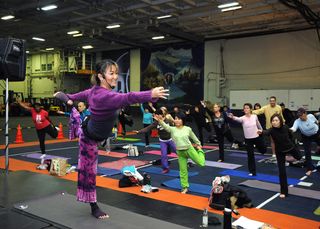Source: Pixabay/CC0
It’s that special time of year when an estimated 40 percent of Americans make New Year’s resolutions. Surveys of U.S. adults reveal that getting in shape is one of the most popular. The bad news is that we nearly always abandon our ambitious New Year’s fitness goals well before grimy snow makes way for daffodils. The good news is that scientific work suggests a better way.
Many frame their fitness quest in terms of changing how they look. Getting healthy might be a nice side benefit, but when it comes down to it, gym memberships are more likely to be purchased with the hopes of getting into those jeans that no longer fit. A typical New Year’s resolution can be like an ad for a gym. You look in the mirror and mentally take your shameful “before” photo, dreaming of a sleek and sexy future you as the “after.”
The fitness industry often leads the way when it comes to this type of body shaming. A sign for a gym in Alabama read, “Tired of being fat and ugly? Just be ugly!” A Gold’s Gym franchisee in Egypt got into hot water for an ad showing a delicious looking pear with the text, “This is no shape for a girl.”
Feeling shame about your body is not a healthy or effective way to reach your fitness goals. Researchers have found that both children and adults are more likely to avoid exercise if they feel shame or stigma about their body size. Research from the University of North Carolina found that women who view their body more in terms of how it looks than how it feels were less likely to exercise. Likewise, a study out of Smith College found that those who exercised for weight and appearance-based reasons exercised less consistently and reported more symptoms of eating disorders and depression. In contrast, those who worked out for health and enjoyment exercised more and showed better objective indicators of health.
Despite these findings, too many in the fitness industry continue to pitch weight loss and appearance goals over other benefits of exercise. Barre and Pilates classes regularly promise longer, leaner muscles. Gyms pitch classes with descriptions suggesting they are capable of targeting abdominal fat specifically or vowing to provide spot reduction of fat despite no evidence that such outcomes are possible.
Working out can help you feel better, think better, and move better. It does not need to change the way you look in order to have these effects.

Source: Pixabay/CC0
For a study recently published in the Journal of Clinical Sport Psychology, I and two colleagues at Northwestern University examined how a fitness instructor’s emphasis on appearance and weight loss (instead of health outcomes) influenced women taking a workout class. We recruited over 200 women between the ages of 18-25 to take a conditioning class. The women completed tests of body satisfaction and mood ahead of time; they repeated these tests after finishing the class. We randomly assigned the women to complete one of two versions of the class. In each version, the instructor played the same music and led the same exercises. But in one version, her motivational comments emphasized health and strength. She said things like, “Almost every activity uses strong back muscles, and strengthening them will help you keep good posture and health for your whole life so that you can do whatever you need your body to do!” In the other version, her motivational comments emphasized appearance and weight loss. She referenced “problem areas” like “pooches” and “back fat” and vowed that an exercise could “target that cottage cheese.” She assured her students they would be ready for bikini season in no time.
Compared to women in the class emphasizing weight and appearance, those in the health-focused class reported a more positive mood afterward. They also felt better about how their bodies looked, despite the fact that their instructor never mentioned appearance. Most importantly, women in the health-focused version of the class reported being less aware of how their body looked during the class and more focused on how it felt. Finally, when asked to list three words that described how they felt at the end of class, those who heard appearance-focused motivational comments were much more likely to write things like “ashamed” and “disgusted with myself.” Women in the health-focused class were more likely to write “accomplished” and “strong.”
The research is clear: Our motivations for exercise matter. If we frame our fitness efforts in terms of goals that don’t require a new body shape and ask fitness professionals to do the same, maybe those resolutions will be a little stickier this year.

Source: Pixabay/CC0


